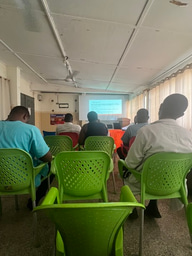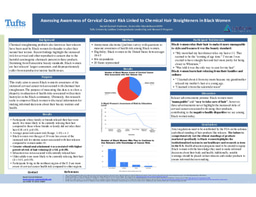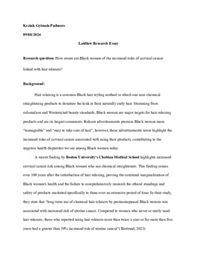My Research Proposal
My research question: How aware are Black women of the increased risks of uterine cancer linked with hair relaxers?
Hair relaxing is a common Black hair styling method in which one uses chemical straightening products to denature the kink in their naturally curly hair. Stemming from colonialism and westernized beauty standards, Black women have used hair relaxers for decades. From its genesis, Black women have been targeted as the main audience for hair-relaxing products and are one of its largest consumers. Relaxer advertisements promise Black women more “manageable” and “easy to take care of hair”, however, these advertisements never highlight the increased risks of uterine cancer associated with using their products, contributing to the negative health disparities we see among Black women today. Studies show that relaxing products contain carcinogenic chemicals –the same chemicals used to preserve dead bodies– and can be absorbed into the skin and causing hormone abnormalities and leading to utering cancer.
Due to hair discrimination in the workplace and negative connotations on Black body features, Black women stray away from embracing their natural hair because it is deemed “ugly”, “unprofessional”, and “untamed” by the Western world, and therefore resort to hair relaxing.
Hair relaxing has been used in the Black community since 1909, yet the 2023 discovery of a link between chemical relaxers and uterine cancer highlights the long history of neglect towards understanding the health impacts of these products on Black women.
The recent finding by Boston University's Chobian Medical School comes over 100 years after the introduction of hair relaxing, highlighting the continual marginalization of Black women's health, and the failure to comprehensively research the ethical standings and safety of products marketed specifically to them over decades. Currently in the U.S, “Black women have the highest mortality rate of uterine cancer subtype compared to all other groups” (Costello, M. K. C, 2022). Additionally in the US, “ Black women and Hispanic or Latina women had a higher odds of diagnosis with advanced-stage cancer compared with White women” (Holt HK, Peterson CE, MacLaughlan David S, et al, 2023), proving the possible and serious implications of hair relaxing on Black women's health.
In my research, I am doing a qualitative study in which I survey Black women of varying ages and educational backgrounds in the U.S. to figure out how aware they are of the links of uterine cancer associated with hair relaxation. Through my research, I wish to know if age and education are factors that can increase a Black woman's awareness of uterine cancer risk due to hair relaxers. I plan to ask Black women ages 18- 65 etc.
From my research conclusions I wish to code my data to figure out the most vulnerable demographics of black women, and work toward spreading awareness about this health risk. From my research I wish to keep Black women informed about hair relaxing, so that they can make the best health decisions for themselves and their families.
Citations:
Woo, A. (2023, December 22). What to Know About the Connection Between Hair Relaxers and Uterine Cancer. NewYork-Presbyterian. https://healthmatters.nyp.org/what-to-know-about-the-connection-between-hair-relaxers-and-uterine-cancer/#:~:text=These%20products%20are%20full%20of
Citations: Costello, M. K. C. (2022, December 20). Black Women Have Highest Mortality Rate of Cervical Cancer Subtype - NCI. Dceg.cancer.gov. https://dceg.cancer.gov/news-events/news/2022/black-women-adc
Yoo, W., Kim, S., Huh, W. K., Dilley, S., Coughlin, S. S., Partridge, E. E., Chung, Y., Dicks, V., Lee, J. K., & Bae, S. (2017). Recent trends in racial and regional disparities in cervical cancer incidence and mortality in United States. PloS one, 12(2), e0172548. https://doi.org/10.1371/journal.pone.0172548
Bertrand, K et.al (2023, October 11). First Large Study of Hair Relaxers Among Black Women Finds Increased Risk of Uterine Cancer | Chobanian & Avedisian School of Medicine. Www.bumc.bu.edu.
Holt HK, Peterson CE, MacLaughlan David S, et al. Mediation of Racial and Ethnic Inequities in the Diagnosis of Advanced-Stage Cervical Cancer by Insurance Status. JAMA Network Open. 2023;6(3):e232985. doi:10.1001/jamanetworkopen.2023.2985




Please sign in
If you are a registered user on Laidlaw Scholars Network, please sign in